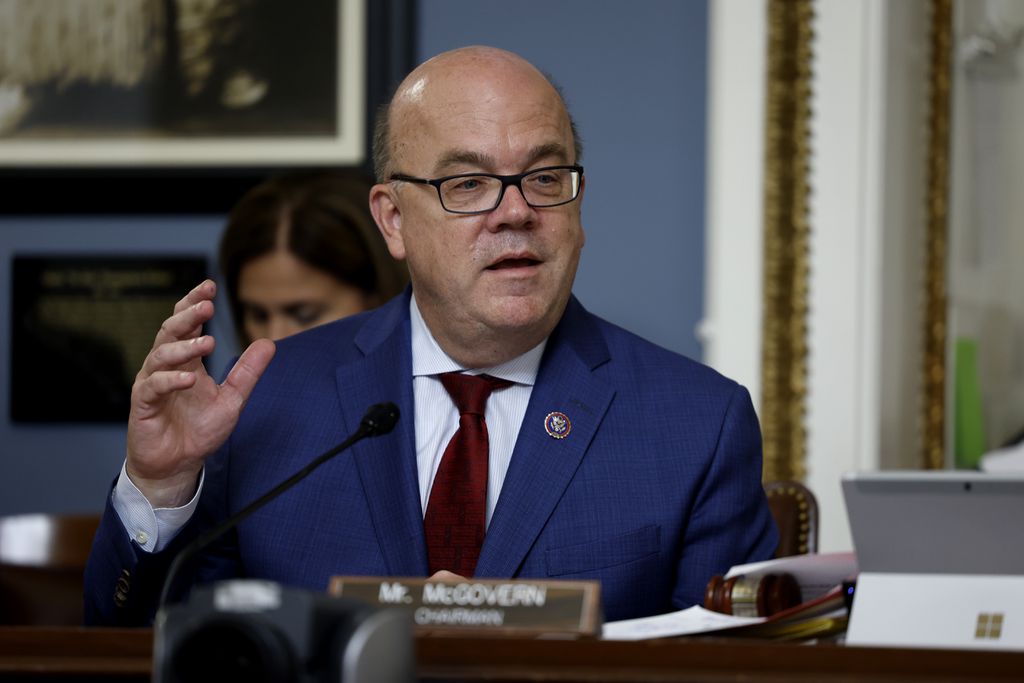Rep. Jim McGovern’s Mission to End Hunger Takes the Spotlight at White House Conference

Representative Jim McGovern (D-MA) first became interested in the problem of food insecurity when he interned in the 1970s for Senator George McGovern, a leading hunger relief advocate.
They shared a name (though no direct relation) and came to share a goal: mobilizing the federal government to end hunger in the United States.
Now, the Worcester Democrat’s decade-old objective of a high-level conference on the issue will come to fruition Wednesday when the White House holds the first such summit since one spearheaded by his mentor more than 50 years ago.
“There are close to 40 million Americans who don’t know where their next meal is going to come from. I’m ashamed of that reality,” McGovern said. “That doesn’t have to be, and if you want to end hunger, then we need a renewed political activism to demand that we move in that direction.”
The White House Conference on Hunger, Nutrition, and Health will bring together policymakers and advocacy groups in panels and working group sessions as the Biden administration presents its ambitious plan to end hunger and diet-related diseases in the next decade. The initiative includes expanding federal nutrition assistance programs and improving transportation to locations with healthy and affordable food options.
“There wouldn’t be a conference without McGovern,” said Catherine D’Amato, chief executive of the Greater Boston Food Bank. She called him the “champion in Congress” of ending food insecurity.
“He has been passionate on this issue his entire career in Congress, and he’s been relentless in his commitment to fighting this fight and to advocating on behalf of so many individuals in our state and around the country,” she added.
McGovern has advocated for legislation to expand nutrition assistance programs since he entered Congress in 1997, frequently speaking on the House floor about food insecurity. He started pushing for the conference during the Obama administration and introduced the bill to fund the summit last October alongside Senator Cory Booker, a New Jersey Democrat, and two Indiana Republicans, Senator Mike Braun and Representative Jackie Walorski.
Walorski was killed in a car crash last month.
The first hunger conference, held in 1969, set a high bar for Wednesday’s event. It was credited with reshaping American food policy and laid the groundwork to expand programs including the Supplemental Nutrition Assistance Program (formerly known as food stamps) and the National School Lunch Program.
But it’s unclear what this latest hunger conference will accomplish. Details leading up to the event have been sparse, and much of the plan the Biden administration will present at the summit relies on support from a narrowly divided Congress that could be in Republican control after the November elections.
Still, McGovern is hopeful that the conference, which he will address along with President Biden, will help build the political support to enact the proposed policies.
“I don’t care what your political persuasion may be, if you don’t make this a priority, then we’re going to let people know about it,” said McGovern, who noted that the effort to hold the conference was bipartisan. “There’s lots of different aspects to this and lots of details to this, but what we have not been doing over the years is bringing everybody together, and that’s what this is about.”
The conference also comes as rising food and living costs have made residents more vulnerable to food insecurity. The Greater Boston Food Bank estimates that as many as one in three Massachusetts adults experienced food insecurity in 2021. That estimate increases to 40 percent for households with children.
“We can’t solve our nation’s hunger crisis without centering the voices and lived experiences of those most impacted,” Representative Ayanna Pressley, a Boston Democrat, said in a statement. She said the conference “will help inform our federal response and confront this crisis head-on,” and praised McGovern “for his years of sweat equity that have made this conference possible.”
Erin McAleer, chief executive of Project Bread, a Boston nonprofit aiming to end food insecurity, said the administration’s plan includes many proposals that her organization has pushed for decades.
“I believe in all of these solutions,” she said. “What we need to focus on is how do we get them across the finish line.”
This summer, McGovern traveled across the country to build support for the conference and learn about ideas that have been successful in local communities. He specifically praised Harlem Grown, a New York City nonprofit that operates urban farms to teach youth about healthy foods.
“It’s unbelievable the differences it’s made in the community,” he said. “There are a lot of good ideas out there. I tell people all the time, ‘We don’t need to reinvent the wheel. There are innovative, effective programs and initiatives happening at the local level that need to be elevated.’”
Shannon Coan, Globe Correspondent
Photo By Anna Moneymaker/Getty
